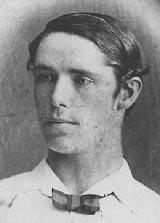There were several choices posted by their "initials";
e.g. BC-Bobby Charlton, BM Bobby Moore, DB-David Beckham, JT-John Terry and BW-Billy Wright....I could go on.
Actually Bobby Charlton was captain 3 times despite having been capped 106 times and he was first given the honour in January 1969. He was not on the list, it was Bob Crompton (pictured above) who was "Pointless".
Compton was the first England captain to score an own goal v Scotland on 6th April 1907.
He was also (probably) the first professional footballer to drive his own car to the national training session in 1908.
Crompton was born in September 1879 and his first team was Trinity FC Sunday School. He won 41 caps and was captain 22 times between 1902-14. His first captaincy was on March 2nd 1903 v Wales at Fratton Park.
He was the first professional player to captain England, prior to that it was an amateur chosen by the FA who believed would behave properly!
In 1911 following his record breaking international appearance (beating Steve Bloomer's record) he was presented with a portrait of himself in oils at Blackburn in 1911.
Crompton spent most of his career at Blackburn Rovers as a full back (1896-1920) making 576 appearances. He captained his club to two Division One championships in 1911-12 and 1913-14. In 1915-16 he guested for Blackpool in the War time regional league, went back to Rovers as a club director, winning the FA Cup in 1928, beating the very powerful Huddersfield Town.
He spent time at Bournemouth in 1935-6 and went to back to Rovers in 1938-9 producing a Division 2 Championship side that season and they won the War Time Cup in 1939-40.
On March 16th 1941 he suffered a heart attack watching Rovers beat Burnley 3-2 and died that evening.
First England captain was Cuthbert Ottoway 30th November 1872 at Hamilton Crescent, Partick v Scotland 0-0. He was an Old Etonian.

No comments:
Post a Comment